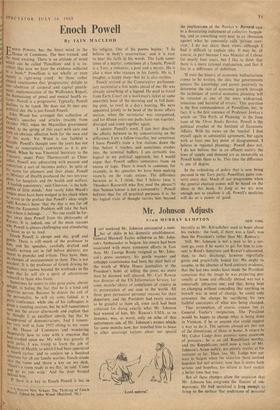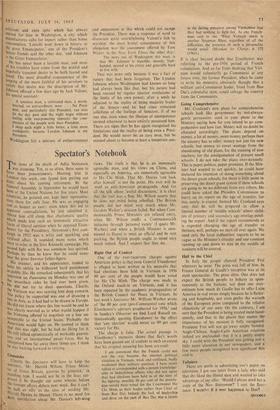Mr. Johnson Adjusts
Front MURRAY kEMPTON NEW YORK
AST weekend Mr. Johnson announced a num- ber of shifts in his domestic establishment. General Maxwell Taylor withdrew as Mr. John- son's Ambassador to Saigon; his tenure had been associated with more strenuous efforts in East Asia. Mr. George Reedy resigned as Mr. John- son's press secretary; his gentle manner and unhappy countenance had been the chief butt of the wrath of White House journalists at the President's habit of telling the press no more than he damned well pleased. Mr. Carl Rowan was director of the US Information Service, for some months object of complaints of crudity in its presentation of our case to the world. All three. gave persuasive personal reasons for their departure, and the -President had every reason to be grateful to them all, since each had been criticised for doing exactly what Mr. Johnson had wanted of him. Mr. Rowan's USIA, as an instance, was, at worst, only an echo of that unfortunate side of Mr. Johnson's nature which, for some months now, has impelled him to boast to other sovereign nations about our special
'Look natural.'
morality as Mr. Khrushchev used to boast about his rockets: the fault, if there was a fault, was then the President's rather than Mr. Rowan's.
Still. Mr. Johnson is not a man to let a ser- vant go, even if he wants to go: for him to con- sent to Reed's departure and Rowan's amounted, then, to their discharge, however regretfully given and prayerfully hoped for. We ought to assume, in the absence of hard contrary evidence, that the last two weeks have made the President conscious that the image he was projecting per- sonally at home and officially abroad was not a universally attractive one, and that, being bent on,changing without conceding that anything in himself was in need of change, he could only announce the change by sacrificing his two faithful executants of what was being changed.
That assumption, of course, cannot run to General Taylor's resignation. The President would he happy to change what is being done in Vietnam, if he or anyone else could suggest a way to do it. The options abroad are just not of the dimensions of those at home. A return to Mr. Cabot Lodge does promise some easement of pressure: he is an old Republican worthy. and the Republican. until now a rock of Mr. Johnson's Asian policy, are plainly restive at his restraint so far. Then, too, Mr. Lodge was our man in Saigon when the situation there seemed hopeless but not serious: now that it seems both serious and hopeless, his return at least evokes a better time that was.
But all these changes allow the suspicion that Mr. Johnson has outgrown the illusion of om- nipotence. He had sustained it long enough to bring to the surface that undertone of personal criticism and even spite which has always existed for him in Washington, a city which manufactures cults for export rather than home consumption. 'Lincoln went down in history as the great Emancipator,' one of the President's S.enate friertds said the other day, 'and Johnson ls the Great Emasculator.' He has never been a lovable man, and most of his troubles have come from the wistful and hopefully transient desire to be both feared and !°ved. The most dreadful consequence of the i°11.8ing of the more faithful of his servitors to satisfy that desire was the description of Mr. Jo.hnson offered a few days ago by Jack Valenti, his special assistant: A sensitive man, a cultivated man, a warm- hearted, an extraordinary man. . . . No Presi- dent. and particularly this President, can ever let the day pas i and the night begin without feeling with overpowering intensity the com- munion of the people with their President. . . . I sleep each night a little better,. a little more confidently, because Lyndon Johnson is my President.
Washington felt a mixture of embarrassment
and amusement at this which could not escape the President. There was a response of need to dissociate quite overwhelming Valenti's itch to worship; the most brutal consequence of this alienation was the assessment offered by Tom Wicker in the New York Times the other day: The news out of Washington this week is that Mr. Johnson is irascible, moody, high- handed, peeved at his critics and generally hard to live with.
That was news only because it was a fact of nature that had been forgotten. The Lyndon Johnson whom Washington had known so long had always been like that, but his nature had been rescued by' regular interior revelations of the limits of his own power; after a while he adjusted to the reality of being majority leader of the Senate—and he had since remained solicitous of ,the feelings Of Senators, if of no one else, even when the illusion of omnipotence seemed otherwise to have entirely possessed him. There are signs that he has again recognised his limitations and the reality of being even a Presi- dent. He would never be an easy man, but he seemed about to become at least a temperate one.

















 Previous page
Previous page